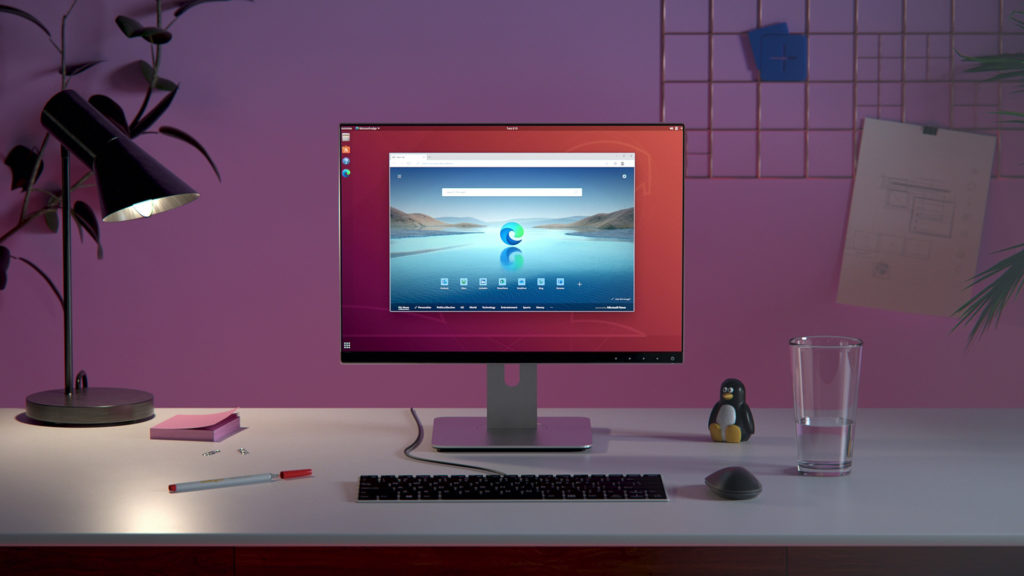That's right, no need to wipe your glasses as that's a real headline here. Microsoft are bringing their Microsoft Edge browser to Linux in October.
Not a huge surprise, as this was already confirmed previously but having a launch month is the next step. Writing on the Windows Experience Blog, Liat Ben-Zur, Corporate Vice President confirmed the Linux launch plan:
Our mission to bring Microsoft Edge to the platforms our customers use daily takes its next step: starting in October, Microsoft Edge on Linux will be available to download on the Dev preview channel. When it’s available, Linux users can go to the Microsoft Edge Insiders site to download the preview channel, or they can download it from the native Linux package manager. And just like other platforms, we always appreciate feedback—it’s the best way to serve our customers.
What's not entirely clear is what they mean by the native Linux package manager, since there's a few. Most likely though, since they (like a lot of others) target Ubuntu directly, they might mean the Snap Store.
All of this is as Microsoft appear to continue treating Linux less like a hostile target, and more like something to take advantage of themselves. Linux has ended up being a big part of Microsoft, from integrating it into Windows with Windows Subsystem for Linux and Linux is a popular and supported choice by Microsoft on their cloud Azure platform too. Heck, they even admitted they were 'on the wrong side of history when open source exploded'.
It's going to be a bit of a hot topic, and I'm sort of dreading asking this because the comments will be quite colourful but here we go anyway: will you use it and what do you think of Microsoft getting certain applications on Linux?
Personally, I am all for it. A key part of the computing experience is having access to the applications you like and want to use, even if it's a browser with a few key differences - it all adds up. The more Linux gets, the better.
Note: this is actually not the first modern Microsoft application to arrive on Linux, as Microsoft Teams became available on Linux late last year. There's also Visual Studio Code and Skype too which have been on Linux for some time now.
I believe the main purpose of this browser is to ensure that the Office 365 suite has a browser they can test against, and guarantee the service works with. Large enterprise customers demand solutions that are cross-platform as they have often mixed environments. So the browser could perhaps be a good thing, maybe a sign of Microsoft moving towards providing platform agnostic services/software rather than forcing Windows down everyone's throatsoffice 365 works without any problems with firefox on linux... we have it at work and i didn't have any problems yet (ok, i still use thunderbird and libreoffice most of the time)...
but maybe they intend to add additional stuff which then only will work with their browser but they don't want to anger the linux business users; they can then just say: "use our browser, it's also available on linux, everything else is rubbish anyway"... that would be the pessimistic outlook...
I have Office 365 at work too and not encountered any major issues on Firefox, except unusually poor performance in some circumstances, not doing anything particularly advanced with Office 365 though. I bet there are edge cases considering the monstrous Excel and Word documents some people produce. From a support perspective, I can see the value for Microsoft to have their own browser even on Linux. Whenever there is a problem, they can just refer to trying their browser and verify if things work there.
I have used Google Apps much more than Office 365, and have encountered lots of minor issues using any browsers other than Chrome. Including Chromium based ones, so even though everyone should be following established web standards the reality appears to be different
Chrome would have to somewhat collapse for me to take the time to switch browsers - last time that happened, it was Firefox that collapsed, forcing me to switch to Chrome.
As I'm working in the Web development area, I'll give Edge on Linux a shot for sure, I also have Chrome, Chromium, Opera and Vivaldi installed. But my daily driver will remain Firefox.
I can see the value for Microsoft to have their own browser even on Linux. Whenever there is a problem, they can just refer to trying their browser and verify if things work there.
I have used Google Apps much more than Office 365, and have encountered lots of minor issues using any browsers other than Chrome. Including Chromium based ones, so even though everyone should be following established web standards the reality appears to be different. In a perfect world though everything should work just fine in any browser
The problem is that Google intentionally hinders other browsers; for example, YouTube is using deprecated HTML which other browsers don't support, just to make the experience there slightly worse on browsers other than Chrome. I wouldn't trust Microsoft not to start doing the same for Edge.
office 365 works without any problems with firefox on linux... we have it at work and i didn't have any problems yet (ok, i still use thunderbird and libreoffice most of the time)...
Not all the options in the O365 apps are available on the web version though.
Wake me up when they release office.
Unlikely. MS wants everybody to use Office 365 anyway, and is very likely to make local versions less and less desirable over time, until the elbowed everybody into their cloud. The last thing they're likely going to do is add new platforms to stand-alone office.
Not necessarily. Office 365 can also be self-hosted, and even included with Nextcloud. Granted, this is the backend service for their cloud but I can easily imagine a flatpak/snap/docker version of O365 might be released for Linux.
I can agree that MS does appear to be less hostile these days, but what those words mean, if you take a moment to think about them, is: it is hostile, only less so. I mean nobody really buys that "we <3 Linux" crap, right?
I may appear a bit less hostile towards MS, too, these days, or maybe I don't.
That aside, I don't see any reason at all to welcome the choice of another browser built on (quick reminder: Google's, Facebook's, Microsoft's, Opera's, Adobe's, ...) Chromium engine.
The problem is that Google intentionally hinders other browsers; for example, YouTube is using deprecated HTML which other browsers don't support, just to make the experience there slightly worse on browsers other than Chrome. I wouldn't trust Microsoft not to start doing the same for Edge.Now that's an old song. Remember when Microsoft Internet Exploder used to pull exactly that kind of crap? The more things change . . .
The problem is that Google intentionally hinders other browsers; for example, YouTube is using deprecated HTML which other browsers don't support, just to make the experience there slightly worse on browsers other than Chrome. I wouldn't trust Microsoft not to start doing the same for Edge.Now that's an old song. Remember when Microsoft Internet Exploder used to pull exactly that kind of crap? The more things change . . .
The other day I was thinking how they had mocked the antitrust deposition with a spoof of the famous SNL sketch:
https://youtu.be/IY2j_GPIqRA
Assholes
Honest question - why would I want to use this over Firefox or Chrome, especially on Linux? It seems an odd choice to port over.Especially since Edge is little more than Microsoft's own custom build of Google Chrome.
I think it's just another step closer to Linux(kernel)-based Windows. They'll keep porting stuff so the future inevitable switch is easier.
I doubt this will happen... Microsoft have invested an awful lot of time and money in the NT kernel.
More likely (though not by much!) is that Microsoft will buy something like Ubuntu, and then do a "commercial" version like Red Hat did way back in the day, whilst spinning-off a "community" version into a separate distro.
Last edited by Cyba.Cowboy on 24 Sep 2020 at 3:11 am UTC
Although my concern is really to make Mozilla more powerful.
For the same reason I don't only get a game for the induced experience, but because of : its development model, if it makes us more clever, if it doesn't incite us to get powerful / polluting machines, if it doesn't have stupid addiction mechanisms...
But of course, the fact I personally don't buy AAA titles won't make a difference. But the fact Mozilla can sustain itself can make a difference.
Let's see where they go with Bethesda.That will be interesting.
Microsoft is only about Microsoft, always has been, always will be.
Last edited by Nanobang on 26 Sep 2020 at 2:29 pm UTC
















 How to set, change and reset your SteamOS / Steam Deck desktop sudo password
How to set, change and reset your SteamOS / Steam Deck desktop sudo password How to set up Decky Loader on Steam Deck / SteamOS for easy plugins
How to set up Decky Loader on Steam Deck / SteamOS for easy plugins
See more from me